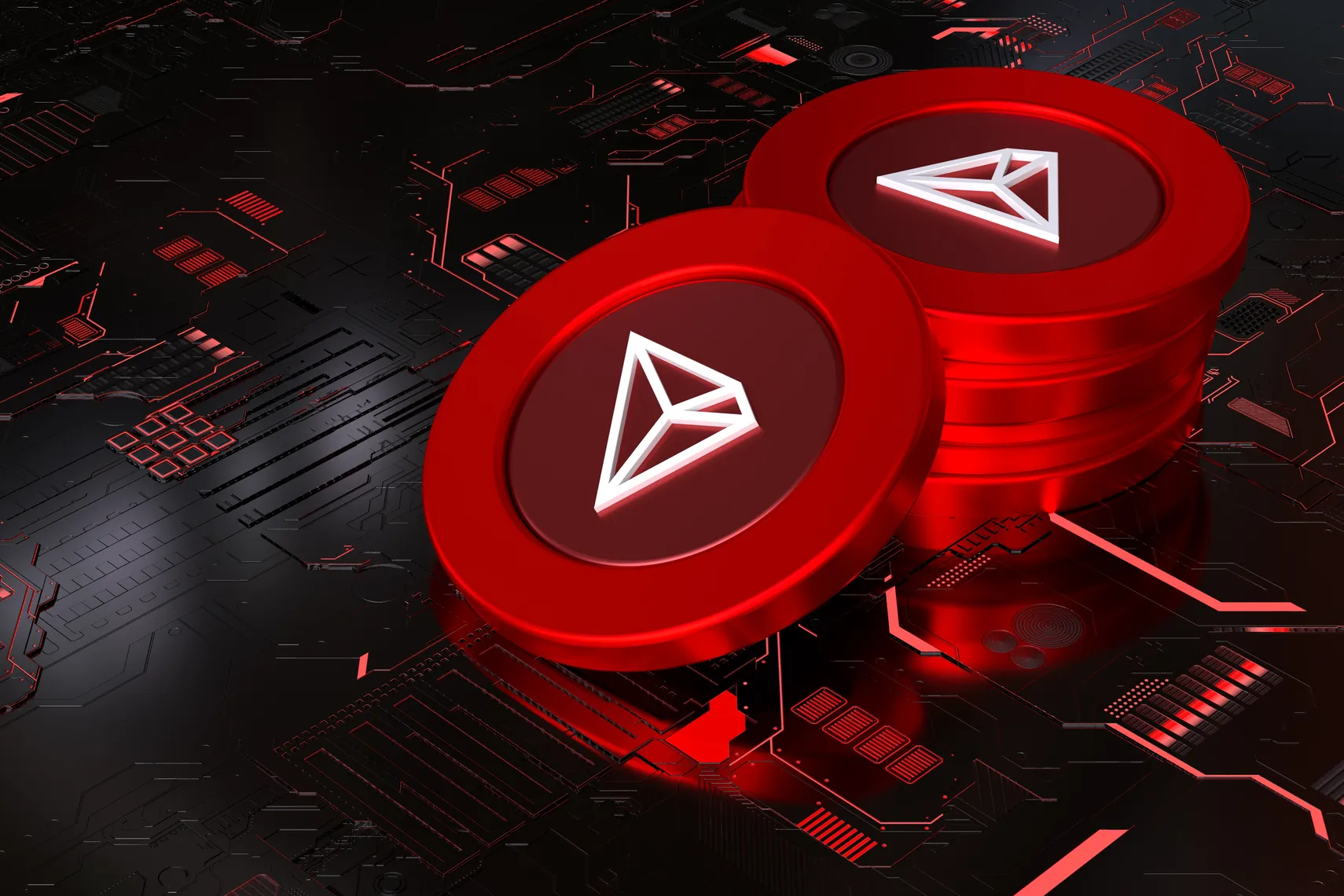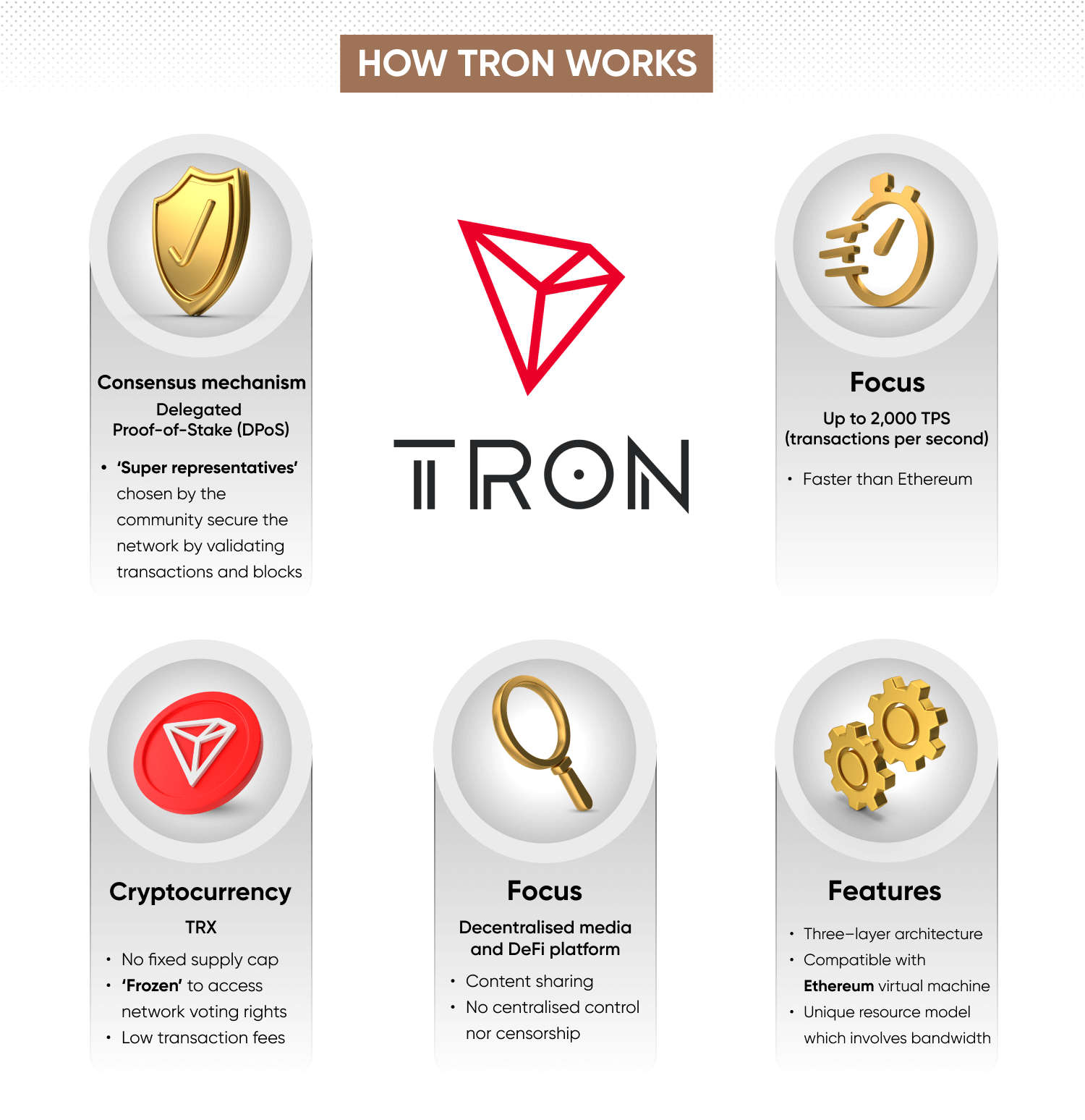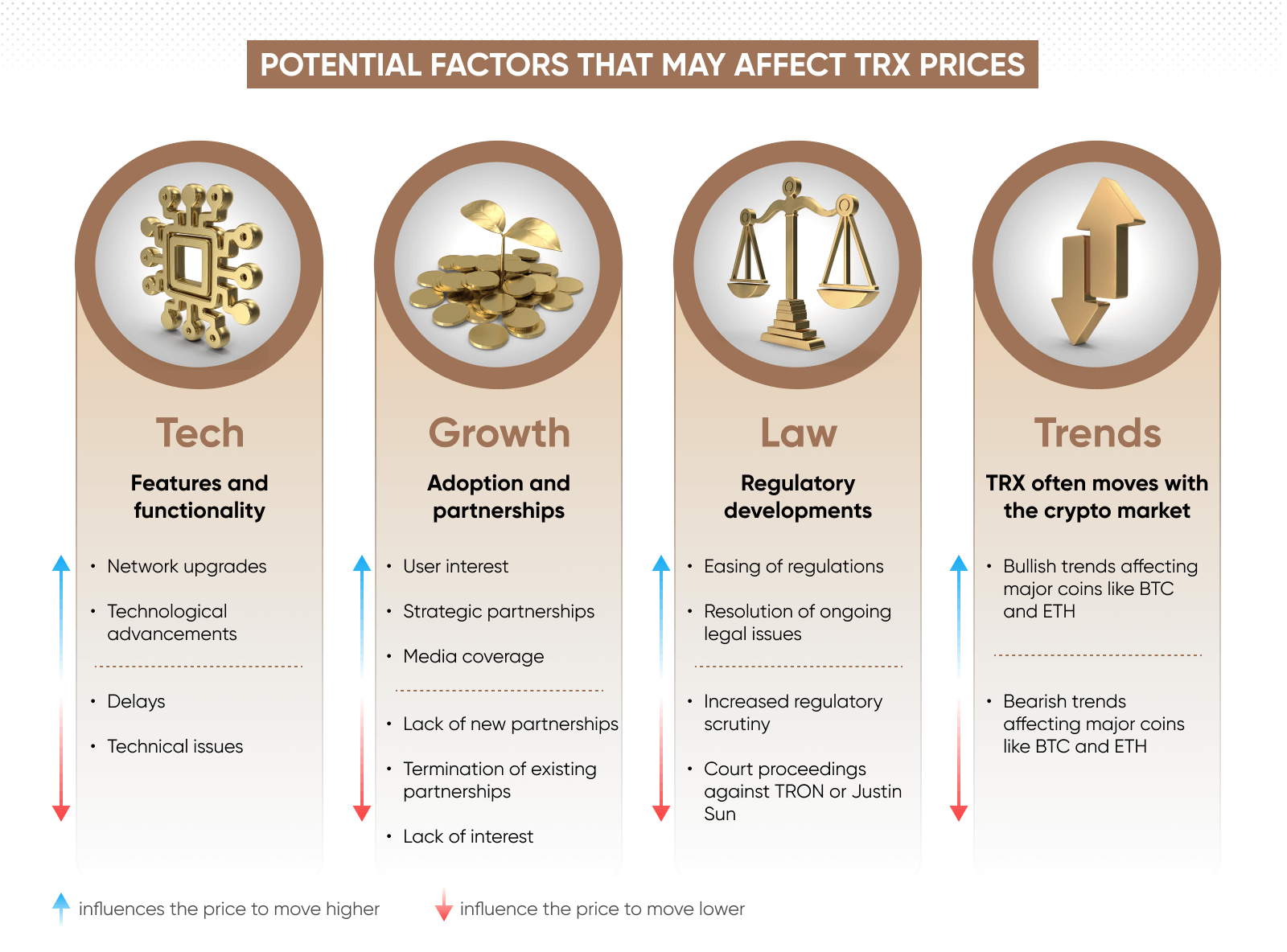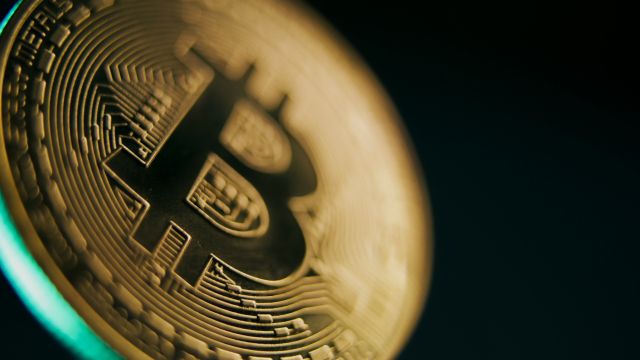What is Tron and how to trade it

Learn about Tron and the TRX price history, how it works, and how to trade TRX/USD via CFDs.
What is Tron?
Tron is an open-source, decentralised, Layer 1 blockchain created by Chinese-born entrepreneur Justin Sun, which launched in 2018. It’s primarily developed by TRON DAO, a decentralised autonomous organisation. The idea behind Tron is to provide a global peer-to-peer ecosystem for sharing and monetising digital media, without centralised intermediaries or censors.
Its cryptocurrency is called TRX, which launched in 2017 and originally ran on Ethereum via the ERC-20 standard. In 2018, TRX migrated to the Tron blockchain adopting its ‘TRC-20’ standard.
Unlike most blockchains, TRX isn’t directly used to pay for network fees on the Tron blockchain. Instead, fees are primarily covered by bandwidth points and energy (earned by freezing TRX). If users lack sufficient bandwidth or energy, TRX is used as a fallback to pay the fees.
As of December 2024, TRX is one of the largest cryptocurrencies, consistently ranking in the top 10-15 cryptos by market capitalisation.
Ethereum vs Tron: What are the differences?
Tron started as an alternative to Ethereum, and as such they share some similarities as well as differences. Here’s how they compare:
|
TRX |
Ethereum (ETH) |
|
|
Origin |
Launched in 2017 by Justin Sun |
Conceived in 2013 by Vitalik Buterin and launched in 2015 |
|
Intent |
Decentralised platform for entertainment content |
Next-generation blockchain |
|
Cryptocurrency |
Tronix (TRX) |
Ether (ETH) |
|
Consensus mechanism |
Delegated proof-of-stake (DPoS) |
Proof-of-stake (PoS) |
|
Philosophy |
Focused on providing an affordable and accessible platform for content creators. |
Prioritises scalability, interoperability, and continuous evolution. |
|
Development and upgrades |
Regular improvements with emphasis on usability and scalability. |
Active development with significant updates like ‘The Merge.’ |
|
Smart contracts and dApps |
Active ecosystem, focusing on entertainment and decentralised finance (DeFi). |
Extensive support with a diverse ecosystem of dApps and DeFi projects. |
|
Transaction speed |
High throughput, handling up to 2,000 TPS |
Moderate speed, handling approximately 15–30 TPS (post–scaling upgrades). |
|
Transaction fees |
Extremely low, often negligible fees |
Variable fees, which can be higher during network congestion. |
|
Token supply |
No fixed supply cap. |
No fixed supply cap, issuance is managed, potentially deflationary. |
|
Market capitalisation |
Frequently in the top 15–20 cryptocurrencies |
Second-largest cryptocurrency by market capitalisation. |
Want to learn about Ethereum and ether (ETH)?
Discover how it works, its price history and more in our comprehensive trader’s guide to Ethereum.
How does Tron work?

Tron is a decentralised blockchain platform with the aim of creating a global digital content entertainment system with support for smart contracts and decentralised applications (dApps). This helps developers build and deploy their own projects.
It’s secured by a delegated proof-of-stake (DPoS) consensus mechanism, where TRX holders can 'freeze' their tokens to gain voting rights and select 'Super Representatives'. These Super Representatives are responsible for validating transactions and maintaining the network's integrity, promoting efficiency and democratic participation.
Tron is capable of handling up to 2,000 transactions per second (TPS), which is significantly higher than Ethereum's capacity. This is due to Tron’s three-layer architecture: the storage layer, core layer, and application layer. The storage layer manages blockchain data, the core layer handles smart contracts and account management, while the application layer is where developers interact with the network.
Tron's Virtual Machine (TVM) is compatible with the Ethereum Virtual Machine (EVM), allowing for seamless migration of Ethereum-based applications to the TRON network. This interoperability aims to attract developers by offering lower fees and faster transaction speeds.
Tron employs a unique resource model involving bandwidth and energy. Users can stake TRX to gain access to these resources, a process that aims to reduce transaction costs and encourage active participation in the network.
What’s the TRX price history?
TRX has experienced a tumultuous price history since its inception in 2017, with significant volatility, trading sentiment shifts and major events.
Its 2017 ICO (initial coin offering) raised a total of $70 million. Tron blockchain launched the following year and TRX migrated from ERC-20 to TRC-20, reaching its first high in January 2018. This surge coincided with the ICO boom, where many projects leveraged the TRON blockchain for token launches.
However, the ‘crypto winter’ arrived shortly after, causing a drastic price drop reflecting broader market uncertainty due to regulatory scrutiny and concerns over market sustainability. By November 2018, TRX had dropped to an all-time low.
During this period, the TRX price fluctuated within a more defined range until early 2021. Meanwhile, Tron made significant strides in technological advancements, including the launch of various decentralised applications (dApps) and partnerships – such as Samsung and BitTorrent – that aimed to enhance its ecosystem.
Breaking new ground
In 2021, TRX broke the $0.10 barrier for the first time since its earlier highs, influenced by growing DeFi (decentralised finance) adoption and increasing transaction volumes on the network.
These gains were short-lived however, as a bear market began in mid-2022 that impacted TRX significantly, as macroeconomic factors such as inflation and interest rate hikes weighed heavily on trading sentiment across the cryptocurrency market.
Tron and the TRX price faced pressure when founder Justin Sun was charged with fraud and securities law violations in 2023, leading to a sharp drop in the TRXs price. This incident highlights the sensitivity of TRX to regulatory developments and market sentiment.
In 2024, TRX began at approximately $0.11 and surged to a yearly high of $0.2242 by late November, driven by strategic token burns and increased market interest – and a significant burn of over 10 million TRX in October pushed the price higher.
Which factors might influence the TRX live price?

TRX prices could be affected by a range of influences, including those specific to the Tron blockchain, the cryptocurrency market and macroeconomic conditions.
Here are some of the key factors which might move the TRX price:
Network upgrades and technological advancements
Technological improvements can significantly impact the TRX price. For instance, the launch of TRON 4.0 in July 2020 introduced privacy features and enhanced interoperability. This upgrade boosted trader confidence, contributing to a rise in TRX's price. Conversely, delays or technical issues in implementing upgrades could negatively affect market perception and the token's value.
Adoption and partnerships
Increased adoption through strategic partnerships can drive demand for TRX. In 2019, Samsung integrated TRX into its Blockchain Keystore app, which expanded its user base and visibility, contributing to a price increase. Similarly, when Huawei added Tron dApps to its AppGallery in 2021, the media coverage and user interest influenced the TRX price to increase. Conversely, a lack of new partnerships or the termination of existing ones could reduce TRON's visibility and reduce demand for TRX, potentially contributing to a price drop.
Regulatory developments
Regulatory news plays a crucial role in TRX's price dynamics. In March 2023, the U.S. Securities and Exchange Commission (SEC) charged founder Justin Sun with fraud and securities law violations. This led to a sharp drop of over 13% in the TRX price within hours, highlighting how legal challenges can erode trader confidence and impact prices. Conversely, positive news or the resolution of legal issues could restore confidence and boost TRX's price.
Overall cryptocurrency market trends
TRX often moves in correlation with the broader cryptocurrency market. Bullish trends in major cryptocurrencies like bitcoin (BTC) and ethereum (ETH) may influence the TRX price to rise, while market-wide downturns may have the opposite effect. Macroeconomic factors – such as changes in global economic conditions or shifts in trading sentiment towards digital assets – could also influence TRX's live price.
Increased interest in cryptocurrencies as alternative assets during times of economic uncertainty can bolster TRX's price. Conversely, if traders move towards traditional assets in response to economic stability or regulatory pressures, TRX's value may decrease.
Learn more about the potential future of Tron and TRX prices, read our latest TRX price predictions.
What are the TRX trading hours?
TRX operates on a decentralised blockchain network that is active 24 hours a day, seven days a week. This means you can trade TRX at any time, including weekends and holidays.
-
Cryptocurrency exchanges – many exchanges facilitate 24/7 trading, allowing for continuous market participation.
-
Online trading platforms – some reliable and trusted brokerages provide TRX trading via CFDs.
If you choose to trade CFDs, you can follow the TRX performance live in US dollars with our comprehensive TRX/USD price chart.
Alternatively, you can check out our TRX/BTC price chart.
Monitoring the cryptocurrency’s activity can help you to keep an eye out for any key fundamental or technical events that may affect short-term movements in its value.
How to trade TRX
TRX is a cryptocurrency, meaning that it can be traded directly on a cryptocurrency exchange or through peer-to-peer transactions. Traders may also choose to trade TRX via a derivative, a financial product that takes (or ‘derives’) its value from the price of the underlying asset.
You could use a contract for difference, or CFD, to trade on the price of TRX pairs. A CFD is a contract, typically between a broker and a trader, where one party agrees to pay the other the difference in the value of a security, between the opening and closing of the trade.
You can use CFDs to trade on whether you think an TRX pair will rise (called ‘going long’) or fall (‘going short’). CFDs give you access to leverage, allowing larger positions with a relatively small outlay. This amplifies your potential profits, but also your potential losses, making CFD trading risky.
You can learn more about trading cryptocurrencies with Capital.com in our comprehensive guide to cryptocurrency trading.
Aside from CFDs, you can also trade TRX pairs through instruments like futures, options, ETFs, and mutual funds. Each offers an alternative to the leveraged trading of CFDs, suiting different risk profiles and strategies.
FAQs
What is Tron and who founded it?
TRX is the cryptocurrency for Tron, a blockchain founded by Justin Sun that launched in 2017. In its first year, TRX was an ERC-20 token, which means it operated on the Ethereum blockchain. TRX migrated to the Tron blockchain when it launched in 2018. TRON DAO is the primary developer of the Tron blockchain.
How is TRX different from other cryptos?
TRX launched during the cryptocurrency boom, surviving the ‘crypto winter’ and a 50%+ fail-rate, according to CoinGecko. As of December 2024, TRX consistently ranks in the top 15 cryptocurrencies by market capitalisation.
Who owns the most TRX?
TRX has no maximum supply and wallet-holders are pseudonymous on the Tron blockchain, which makes it difficult to identify precisely who owns the most TRX.
Considering his role as the Tron founder, Justin Sun. along with other core developers and team members, could own a significant proportion of TRX. Institutional investors may hold a larger-than-average share of the total TRX supply.
It might also be assumed that early-adopters, including those who acquired TRX earlier in its life – with a sustained belief in the token’s potential value – could own a substantial amount.
Visit our other complete guides

How to trade Ethereum
